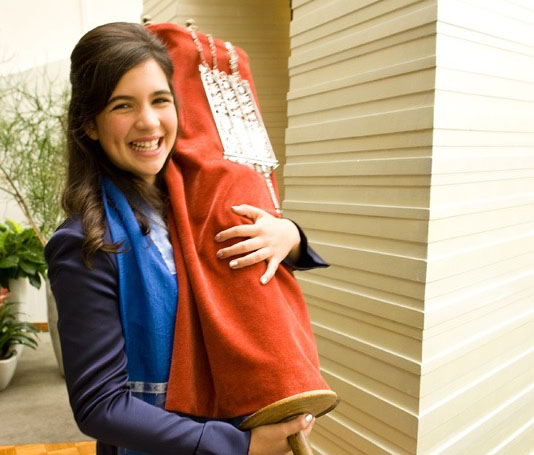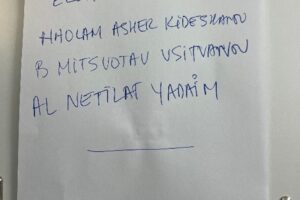How do you inspire your child to inspire us all? Your child will teach our community.
Your child can email their Torah portion and bar/bat mitzvah speech to family, friends, and loved one. This allows them to share their thoughts on the Torah’s wisdom, even during periods of social isolation.
One of the most important aspects of the bar/bat mitzvah experience is providing a young person with the opportunity to study and teach Torah. “Torah” literally refers to the Five Books of Moses or the Pentateuch, but more broadly to the great storehouse of Jewish wisdom—ancient, medieval and modern. Judaism is a culture animated by the study of and creative interpretation of Torah; a rich textual tradition replete with stories, ethical maxims, prayers, laws, poetry, and humor. The text of the Hebrew Bible is itself thousands of years old and generations of Jews have continuously read and discussed its meaning in their lives.
In initiating a bar or bat mitzvah into Jewish adulthood, part of the goal is to help the young person discover the spiritual, moral, and existential resources available to them through the study of Torah. Further, we wish to articulate to our children that their voices matter — that their insights and interpretations can be beneficial, even transformative, to others. We seek to instill in our kids the understanding that they are both inheritors and innovators of Jewish life and thought. This sensibility is, in fact, a part of many Jewish observances that include elements designed to engage and empower Jewish children and young people. One well-known example is the Passover Seder, at which it is customary for the youngest child to ask the Four Questions.
One way to communicate this sacred idea at the bar/bat mitzvah ceremony is to provide the honoree the opportunity to offer a Torah teaching. This is often a central part of synagogue training programs or the work of a private tutor. Below are two brief lists of suggestions for how a bar/bat mitzvah can prepare his/her teaching and how s/he might present the teaching. We recommend you review these lists with your child or student and others involved in the preparation process. Remember, these are suggestions, not hard-and-fast rules:
Please share this with your bar/bat mitzvah child:
When preparing your Torah teaching:
- Read the Torah and haftarah portions for the week of your celebration in English (and Hebrew, if possible)?
- As you read, note any interesting ideas or topics in either (or both) text.
- Is there one idea or topic especially interesting? Why?
- How does this subject relate to contemporary life?
- How does it relate to your life and the experience of becoming a bar or bat mitzvah?
- Are there other textual or cultural sources (e.g., a movie, painting, poem) on your topic that might help deepen or clarify your thoughts?
- Choose at least one person with whom you can have an ongoing conversation about your bar/bat mitzvah teaching as you develop your thoughts and writing (over the course of a few months). How often will you check in with them? Who else could be helpful in developing and drafting your presentation?
For more information on preparing a meaningful bar/bat mitzvah teaching — including alternatives to a speech — see Rabbi Goldie Milgram.
Elements of your speech (10-12 minutes):
- Welcome – Greet and thank all those present and those with you in spirit
- Introduction – What will you be sharing with your community and why?
- Torah Lesson – What is one key lesson you learned from your studies?
- Contemporary & Personal Connections – Why does it matter today, to you?
- Give Thanks – Honor the people who helped you prepare and who helped you grow into a bar/bat mitzvah
- Enjoy – Take a deep breath and enjoy the moment, knowing you have worked hard and contributed to your community!
Thank you Rabbi Or Rose for your help and insight on this article!
We’re sharing Lucy and Caroline’s (Andy’s daughters) speeches here as examples:






